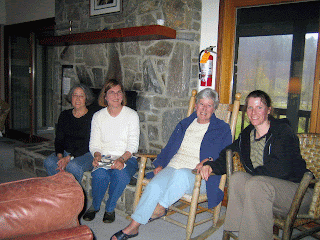
For the second time (our first took place last fall), one of the book clubs of which I'm a member held a weekend "retreat." Our book club was started by and is held monthly at Malaprop's bookstore, an independent bookstore that we all frequent (at right, some of our "retreaters," including, at far right, Malaprop general manager Linda Barrett Knopp). We convened late last Friday afternoon at a nearby retreat center and headed home early Sunday afternoon. In between we discussed two books and two novellas: David Oshinsky's Polio: An American Story, Haven Kimmel's She Got Up Off the Couch (ugh! -- the first book I've read for this group that I couldn't stand to finish), Tillie Olsen's Tell me a Riddle (which I loved), and The Death of Ivan Ilych by Tolstoy.
My own bias about book club reading is that fiction should rule the day, and that if non-fiction must be introduced, it should be in small doses -- say, four or five novels for every work of non-fiction. So I was disappointed to learn that most of our reading for the retreat would be non-fiction. As I said to my bookmates, fiction provides much more fertile ground for discussion. Beyond the actual topic and story, fiction, if it's good, offers many riches to mine, from the writer's style, technique, and syntax to structure, themes, and imagery, to the use of symbols, metaphor and simile (and more). It fascinated me, for example, that Tolstoy used the structure of his chapters to parallel the deterioration of Ivan Ilych's body (leading him to his spiritual birth) by making each chapter progessively shorter than the next: from approximately 300 lines in the first chapter to approximately 72 lines in the last; and that Tillie Olsen enriched Tell me a Riddle by using the voice, mouth (not just words, but coughs, screams, rasps, songs), silence, and listening in giving meaning to a story that's much about finding one's own voice. And I derived pleasure from a small thing: how Olsen helps move her protagonist from the specific to the universal by naming her Eva, as in "Eve," the Bible's first female creation.
Non-fiction can be a source of good discussion about the book's topic, particularly if that topic is controversial and/or timely, and you can certainly argue about whether the writer accomplished what she set out to do or told her story effectively. And, of course, I'm not denying that good writers of non-fiction may use literary devices to enhance the reading experience. But at the end of the day good fiction gives the curious reader much more to work with and explore. (This just cries out for a rebuttal from a non-fiction enthusiast, don't you think?)
Those issues aside, what a wonderful experience it was to again spend two days with smart and interesting women talking about BOOKS! Sheer heaven. A joy, too, to get to know each other a little better, since some of us rarely see each other outside of our book group setting. Not to mention the gratification of eating our way through the weekend, which as delightful as it is while you're doing it, is nowhere near as nourishing in its aftermath as the discussions.
No comments:
Post a Comment